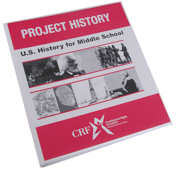Browse Catalog | View Cart | Contact Customer Service | Store Policy | Download Catalog (PDF)
Project History

-
A reading based on a middle-school U.S. history standard.
-
Questions to engage students in a discussion.
-
A product-based activity that helps students delve more deeply into the reading and develop critical thinking skills.
Six standards-based, interactive lessons:
1: Thomas Jefferson and the Declaration of Independence examines the key ideas about government expressed in this document and how Americans value these ideas today.
2: The Federalist Papers looks at the ideas behind the Constitution and the role of leaders in writing the Federalist Papers and fighting for the ratification of the Constitution.
3: Slavery in the American South examines the economic, cultural, and social characteristics of slavery in the American South after 1800.
4: How the Women's Rights Movement Began traces the beginnings of the women's rights movement and the leadership role women played in antebellum reform movements.
5: Black Soldiers in Union Blue looks at how African Americans struggled for the right to fight with the Union Army in the Civil War and the effect that black soldiers and regiments had on the war and the American people.
6: Rockefeller and the Standard Oil Monopoly focuses on John D. Rockefeller and the development of the Standard Oil Trust to explore the changing social and political conditions in the United States during the Industrial Age.
Also included are Hands-On History Projects. These long-term projects give students an opportunity to pursue a U.S. history topic in depth and also serve as an exciting introduction to History Day. Project History includes four Hands-On History Projects:
-
Leaders Forum. Students portray American leaders who meet to discuss issues in U.S. history from the perspective of the leaders they are portraying.
-
History Network Newscast. Students create news-format presentations describing an event in U.S. history, its background, causes, consequences, and significance.
-
American History Museum Exhibit. Students create an exhibit using visuals and narrative descriptions.
-
Project History Book. Students create an alphabetically arranged "encyclopedia" defining, illustrating, and describing the significance of words or phrases from U.S. history.
Project History Web Links: The CRF web site (www.crf-usa.org) supports each Project History lesson with online links to focused readings and other resources.
NEW!!! You can now purchase selected units electronically and download them now:
 The Federalist Papers
The Federalist Papers
This lesson explores the Federalist Papers and the historic roles of Hamilton, Madison, and Jay in laying out the arguments for the U.S. Constitution. Students take on the roles of these founders as well as the Anti-Federalists for a debate on the adoption of the Constitution.

Night Forever: Slavery in the American South
In this lesson, students learn about the economic, cultural, and social characteristics of slavery in the American South before the Civil War. They then role-play abolitionists writing editorials against slavery.

How the Women’s Rights Movement Began
In this lesson, students learn about the beginnings of the women’s rights movement and the leadership role women played in antebellum reform movements, tying it to a hypothetical modern movement for the rights of teenagers.

African Americans and the Civil War
This lesson looks at how African Americans struggled to be allowed to fight for the Union Army in the Civil War and the effect that black soldiers had on the war and the American people. Students apply their knowledge and work in groups to create their own edition of Frederick Douglass’s Paper.

Rockefeller and the Standard Oil Monopoly
This lesson focuses on John D. Rockefeller, the Standard Oil Company that he created, and the growth of industrialism. Students prepare and present a “television” interview of an industrialist from the Gilded Age.
You might also be interested in:
Browse Catalog | View Cart | Contact Customer Service | Store Policy | Download Catalog (PDF)

